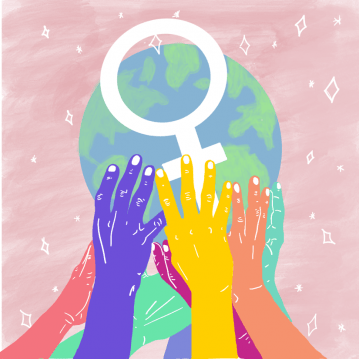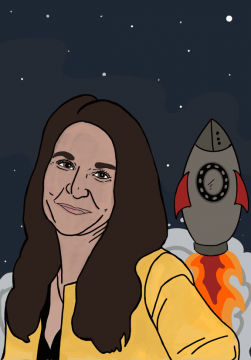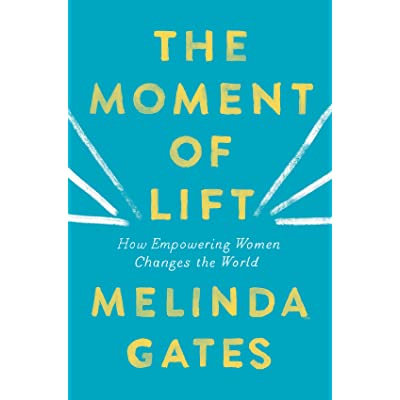The world’s countdown to gender equality – total and absolute – has been slow, arduous, and occasionally regressive. The gender equality timeline has seen pushes and shoves towards an equal share of the pie for males and females, and now, finally, for non-conforming, trans and binary individuals. Even the smallest of steps in the right direction culminate into a greater impetus – an opportunity, an ally, a captive audience – that lifts individuals and groups of women towards their fully realized potential – not unlike a rocket on a launch pad aiming for the stars. Borrowing an analogy from her late father, an Apollo aerospace engineer, Melinda Gates incites space-age, where-no-woman-has-gone-before imagery in her memoir meets mission statement book, The Moment of Lift: How Empowering Women Changes the World. Put simply, and in her own words, the book ponders two questions central to women’s equality in the global health sphere:
“How can we summon a moment of lift for human beings – and especially for women? Because when you lift up women, you lift up humanity. And how can we create a moment of lift in human hearts so that we all want to lift up women? Because sometimes all that’s needed to lift women up is to stop pulling them down.”1
What follows is a philosophical manifesto for tackling women-oriented family planning programs, maternal and newborn health, the education of girls, child marriage, unpaid labor, and women in agriculture and the workplace. Melinda interlaces her own stories of lift – from her first encounters with computers and an encouraging high school teacher to the challenges of maintaining equality in her own marriage – with those of women she meets globally in surroundings and circumstances vastly different from her own. Her prose is simply written, tender with the reader, and kind to her subjects – but above all, humble and fully aware of her position of privilege in telling these women’s stories and of the resources that enable her to facilitate moments of “lift.”
For two decades, the Bill & Melinda Gates Foundation – headed by the most affluent family in America, computer software royalty – has been a pioneer in global health philanthropy and a primary driver for infectious disease innovations. It is now the largest private philanthropic foundation in the U.S. In 2016, the foundation announced an $80 million commitment to closing gender data gaps and furthering progress for women and girls. The commitment is in direct support of the United Nations Sustainable Development Goals and is a shift in Foundation priorities, not to mention a powerful example of the Gates’ dedication to issues of inequality. (( The Bill & Melinda Gates Foundation (2016, May 7). The Bill & Melinda Gates Foundation Announces $80 MillionCommitment To Close Gender Data Gaps and Accelerate Progress for Women and Girls. Retrieved from The Bill & Melinda Gates Foundation: https://www.gatesfoundation.org/media-center/press-releases/2016/05/gates-foundation-announces-80-mill-doll-comm-closing-gender-data-gaps-acc-progress-for-women-girls))(( Kinosian, J. (2019, April 24). Review: Melinda Gates’ ‘Moment of Lift’ calls to break barriers that hold women back. Los Angeles Times.)) ((The Bill & Melinda Gates Foundation. (2019). Who We Are: Foundation Fact Sheet. Retrieved from The Bill & Melinda Gates Foundation: https://www.gatesfoundation.org/Who-We-Are/General-Information/Foundation-Factsheet)).
If you’re looking for rebuttals on how the Foundation operates, especially amidst the buzz and concern surrounding the hordes of Foundation-employed consulting firms (see Vox’s piece “How McKinsey infiltrated the world of global public health“), you won’t find one here. Nor will you find a defense of vertical programming and the prioritization of infectious disease surveillance and vaccine innovation – another dominating critique of the Foundation’s funding priority. If anything, Melinda establishes a blueprint for other millionaires and billionaires to responsibly spend their amassed riches, which are grossly disproportionate to the income of the average household (looking at you, Bezos).

Melinda shines brightest when discussing her emergence as a public health advocate, specifically, a devout Catholic woman advocating for family planning programming. She treads lightly in her critiques of the current political climate and its threat to the main pillars of female reproductive rights (Roe v. Wade, right of choice, insured birth control, etc.) – much to some book reviewers’ chagrin. For example, NPR’s book review blasts Melinda for not naming names and pointing fingers. While the reviewer, Lily Meyer, finds this to be a major flaw, I find it tactful. To be clear, this book is not written for the staunchly global health-minded individual or even for those in the public and global health sectors – its intended audience seems broader, as does its purpose: to plant a seed and provide a beginner’s guide, not a radical manual for change. To me this feels smart – abortion and family planning are extremely polarizing topics, especially among women. Though I agree with NPR’s critique that the anecdotes, while compelling, are not strong enough arguments to flip firmly held opinions, Melinda’s purpose is to be relatable and connect to the fence-sitters, the religiously conflicted, the shy or timid and those apprehensive of the intensity of the #MeToo movement. Melinda masterfully writes to the apprehensive while riding the momentum of #MeToo, the record-breaking number of women running for public office, and the ongoing debates surrounding family planning in U.S. politics, thereby demonstrating the relevance of her reflections and call to action. Meyer’s line of questioning for why the book was written, her main critique, perfectly highlights Gates’ intent without realizing it:
“Why devote time to book touring rather than lobbying the U.N.? Surely, Gates does not expect readers’ engagement with The Moment of Lift to seriously impact the Gates Foundation’s work, and presumably she does not need money. She could want acclaim, but she writes frequently about how shy she is, how uncomfortable with public advocacy. Taking that claim at face value makes the question, even more pressing: What exactly is this book for?”2
By writing informally, Melinda invites readers to explore her global experiences, to become steeped in issues of gender equality alongside her. It is likely that the majority of her readers will only affirm their beliefs and values, but her nation-wide book tour and writing style suggest that Melinda invites all women to answer her second, probing question: How do we get people to care about equality – how do we create a moment of lift in human hearts? With helpful hints, Melinda challenges her readers to grapple with connectivity as an essential prerequisite for reaching and maintaining total equality. I could recap her sentiments but to avoid doing them a disservice, I’ll let Melinda do the talking:
“The supreme goal of humanity is not equality but connection. People can be equal, but still isolated – not feeling the bonds that tie them together. Equality without connection misses the whole point. When people are connected, they feel woven into each other. You are part of me, and I am part of you. I can’t be happy if you’re sad. I can’t win if you lose. If either of us suffers, we suffer together… We can love without limits. We see ourselves in others. We see ourselves as others.”
Considering our current state of affairs, Melinda’s words ring truer than ever. As we face what could be months of self-quarantine in the time of COVID-19, connection is key to battling an invisible, virulent infection in an equitable manner. If we care for our neighbors, if we truly believe that we can’t win if others lose, we may come out with a healthier, cohesive, and equal society. The coronavirus pandemic demonstrates this need for purposeful equality through greater strides towards collectivity. No life is more valuable than another, just as no gender or race is superior to the others. Though she writes using gender as the lens, Melinda’s lessons extend past the confinements of sex and gender lending wisdom to many, if not all, arenas of public health.

Why review this book for a public health journal? Aside from the obvious connections to global health and descriptions of the Foundation’s grant recipient projects, The Moment of Lift brings human stories and faces to the issues of unpaid labor, access to family planning, and the harmful perpetuation of gender roles, and instills the need to continue to push and shove towards greater equality. As a Seattle native and someone who has worked alongside Gates-funded research projects, I tried to keep my biases at the door when I picked up my copy (full disclosure: my mother and I attended her final book talk in Seattle – I dare you to find a better Mother’s Day outing). I was pleasantly surprised that the book was more personal than an advertisement for the Foundation and that it connected at a human level. It’s not often that I’m able to recommend a book to family members and friends outside my field that gives us common ground without alienating someone. It’s a hopeful read too – something that is much needed in the face of today’s constant, discouraging newsreel.
- Gates, M. (2019). The Moment of Lift: How Empowering Women Changes the World. New York: Flatiron Books. [↩]
- Meyer, L. (2019, April 23). ‘The Moment of Lift’ Is More Of A Whisper Than A Call To Action. Retrieved from NPR : https://www.npr.org/2019/04/23/716066240/the-moment-of-lift-is-more-of-a-whisper-than-a-call-to-action [↩]




